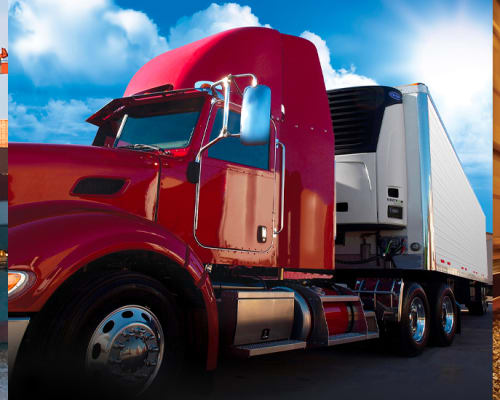Innovative Cold Transport Companies for Efficient Temperature Control
Innovative Cold Transport Companies for Efficient Temperature Control
Blog Article
A Comprehensive Overview of the Mechanisms Behind Refrigerated Truck Transportation and Its Duty in Food Safety
Cooled vehicle transportation is crucial in keeping food security, utilizing sophisticated temperature level control devices and insulation innovations to protect disposable products throughout transit. The assimilation of innovative tracking systems makes certain real-time oversight, permitting for prompt intervention in case of temperature deviations. These vital components not just protect the integrity of foodstuff however additionally play an important function in stopping foodborne diseases. Nonetheless, understanding exactly how these devices function together increases important concerns about their effectiveness and potential areas for enhancement within the industry. What ramifications do these variables have for the future of food safety and security?
Importance of Refrigerated Transportation
Refrigerated transport plays a crucial role in preserving the honesty and security of perishable goods throughout the supply chain (transport refrigeration companies). This specific logistics system is crucial for preserving the quality of food items, consisting of fresh fruit and vegetables, milk items, meats, and fish and shellfish, which are susceptible to spoilage when exposed to temperature level changes. The capability to maintain a consistent and controlled environment guarantees that these products keep their nutritional value, flavor, and safety for customers
Furthermore, chilled transportation decreases the threats of foodborne health problems, which can occur from the development of hazardous bacteria in improperly stored products. By adhering to rigorous temperature demands, companies not only conform with regulative requirements but also foster customer trust fund and brand name integrity. The financial effects are considerable; lowered putridity prices equate to lower losses for retailers and suppliers, adding to general success.
Moreover, the boosting global demand for fresh and high-quality food products further highlights the value of refrigerated transport. As supply chains become extra complicated and extend internationally, the demand for effective temperature-controlled logistics continues to grow, underpinning the whole food distribution network and guaranteeing that disposable products reach their destinations securely and successfully.
Temperature Level Control Systems
Keeping optimum temperature level control is important in the transportation of perishable items, and a variety of devices are employed to accomplish this objective. Refrigerated vehicles utilize sophisticated refrigeration systems, mainly using vapor compression innovation, which circulates cooling agent via evaporator and condenser coils to remove warmth from the cargo area. This procedure makes certain that the inside remains consistently cool, thus protecting the quality and security of the products being carried.
Furthermore, trucks are outfitted with temperature surveillance systems that supply real-time data on the internal setting. These systems commonly consist of electronic sensors and alarms to alert operators in instance of temperature fluctuations, making it possible for immediate restorative actions. Some refrigerated vehicles additionally include programmable temperature setups, permitting accurate control tailored to certain sorts of freight, such as fruits, drugs, or veggies.
Moreover, using pre-cooling techniques before packing boosts the performance of temperature level control. By decreasing the freight area's temperature prior to the introduction of items, the threat of temperature level spikes throughout transportation is minimized. These systems jointly contribute to a reputable cool chain, vital for maintaining the honesty and safety and security of subject to spoiling food things throughout the transport procedure.
Insulation Technologies
Insulation modern technologies play a vital role in enhancing the effectiveness of chilled vehicle transportation by reducing thermal exchange between the freight location and the exterior setting. Effective insulation is important for preserving the needed temperature level for subject to spoiling items, thereby guaranteeing food security and high quality throughout transportation.
Usual insulation products used in chilled vehicles include polyurethane foam, polystyrene, and fiberglass, each offering varying degrees of thermal resistance. Polyurethane foam, understood for its exceptional insulating properties, is usually used as stiff panels that can be formed to fit the truck's interior. Polystyrene supplies a light-weight alternative while still giving appropriate thermal security. Fiberglass, although less usual, can be effective in certain applications due to its sturdiness and resistance to dampness.

Advanced Monitoring Equipment
To make sure the stability of perishable products during transportation, advanced monitoring systems have actually become a crucial technology in the cooled vehicle market - cold transport companies. These systems utilize a mix of sensors, information loggers, and real-time tracking modern technologies to constantly monitor temperature level, humidity, and total freight problems throughout the journey. By supplying immediate comments on ecological variables, pop over to these guys these systems enable for punctual restorative activities, thereby safeguarding item high quality
Modern keeping track of systems are outfitted with cordless connection, enabling seamless data transmission to logistical centers and stakeholders. This connectivity helps with remote tracking, which is crucial for preserving conformity with sector regulations and requirements. Alerts can be created in real-time, notifying drivers of any variances from pre-set limits, thus reducing the threat of spoilage.
Additionally, the assimilation of advanced analytics and maker understanding formulas enhances predictive abilities, permitting much better preparation and threat analysis. Historical data gathered from these systems can notify future transportation approaches, maximizing routes and decreasing prospective dangers. On the whole, the release of sophisticated tracking systems represents a considerable innovation in the chilled transportation market, enhancing the dedication to maintaining the high quality and safety and security of subject to spoiling products throughout their trip.
Influence on Food Safety And Security Requirements
The assimilation of innovative tracking systems in refrigerated vehicle transportation has actually dramatically influenced food security standards across the supply chain. These systems enable real-time tracking of temperature, moisture, and various other important specifications vital for maintaining the integrity of perishable items. By making certain that products continue to be within specified temperature level ranges during transportation, these innovations reduce the risk of microbial development and putridity, which are critical in food safety and security.

The fostering of information analytics likewise permits aggressive decision-making, making it possible for business to determine potential problems prior to they intensify into food security infractions. As a result, the incorporation of innovative tracking systems not only enhances functional effectiveness but likewise cultivates higher liability in the food top article supply chain. This development underscores the essential function of modern technology in elevating food safety and security standards and ensuring customer confidence in the items they get.
Final Thought
To conclude, cooled truck transportation is necessary for maintaining food security via reliable temperature control, advanced insulation innovations, and continuous surveillance systems. These mechanisms function synergistically to preserve the quality of subject to spoiling goods and minimize the danger of foodborne ailments. Adherence to rigorous food safety and security requirements is accomplished with the application of these technologies, highlighting the important duty of refrigerated transport in the food supply chain and its effect on public health.
Chilled vehicle transport is vital in keeping food safety, utilizing advanced temperature level control devices and insulation innovations to guard subject to spoiling goods during transit - refrigerated truck companies. Appropriate maintenance of insulation stability, including regular checks for wear or damage, is additionally essential to sustain the efficiency of refrigerated transportation systems and make certain conformity with food safety guidelines
The assimilation of sophisticated transport refrigeration companies tracking systems in refrigerated truck transportation has actually significantly affected food security standards throughout the supply chain.In final thought, cooled truck transport is important for keeping food safety and security through reliable temperature level control, progressed insulation innovations, and constant surveillance systems. Adherence to rigorous food security requirements is achieved via the execution of these innovations, highlighting the vital function of refrigerated transportation in the food supply chain and its impact on public wellness.
Report this page